Every web developer has tasks they’d rather avoid. Or ones that simply take up too much time. Quite often, they’re little things that get in the way of more important work.
You could hire someone to help with these tasks. But that can be cost-prohibitive – not to mention inefficient. And there’s also the challenge of finding someone who is reliable.
This is where the advent of artificial intelligence (AI) tools like ChatGPT comes into play. While they can’t do everything for us, they can make quick work of common tasks. That leaves you with more time to focus on other aspects of your projects.
Today, we’ll look at a few common tasks that ChatGPT can perform for web developers. You might be surprised at some of its capabilities.
Create a Regular Expression Based on Your Instructions
The logic and syntax of regular expressions (regex) can be difficult to grasp. So much that you may cringe at the idea of having to write one. We hear you!
On the other hand, regex can be quite powerful. It can be used to find matching data in even the most complicated text strings. If you’re writing code, you’ll eventually need one.
Based on our experiments, ChatGPT is surprisingly good at creating regular expressions. We asked it to write an expression that could find a unique ID within a URL. With just a few basic parameters in our prompt, the tool immediately produced the code and explained how it works.
If you use AI for nothing else in your life, this may be the one task worth trying. It could save your sanity.
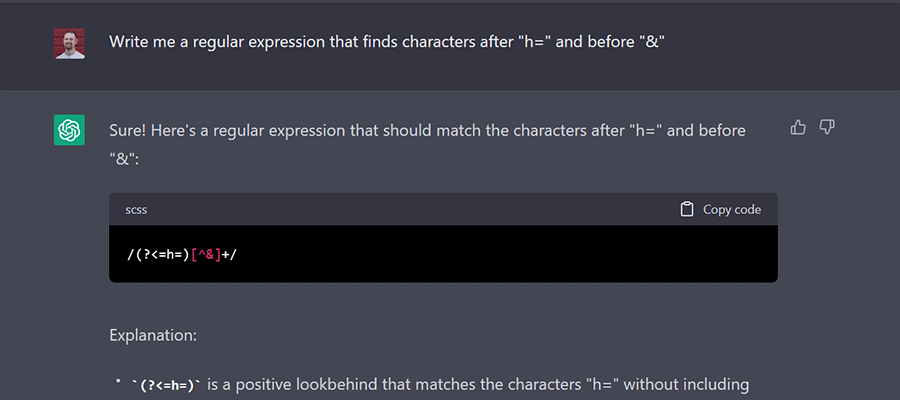
Write a Basic WordPress Plugin
Sometimes, the hardest part of writing a custom WordPress plugin is getting started. Trying to include “all the things” at once can lead to frustration. And working within the various APIs WordPress offers can be confusing.
ChatGPT can help. No, it won’t write you a fully-fledged WooCommerce competitor. But it can help get you pointed in the right direction.
For example, you might use it to create a basic plugin. And the tool can also help you add features as you think of them. ChatGPT remembers your “conversations” and lets you go back to them at any time.
A good start is crucial. AI can take care of the initial dirty work. Once you have a solid foundation for your plugin, the sky’s the limit.
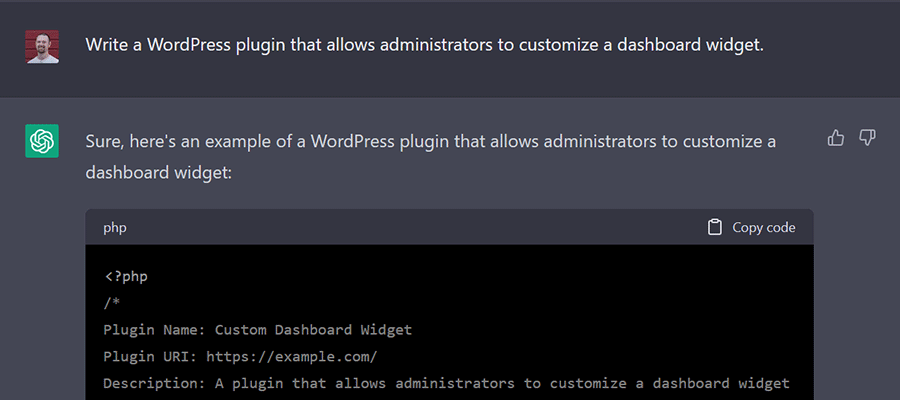
Summarize a Blog Post for SEO
Adding a meta description for website content is good practice. It can have a positive impact on search engine optimization (SEO). Plus, it helps readers understand the subject matter when browsing a search results page (SERP).
But writing these summaries can be a pain. Particularly if the content was written by your client. You’ll have to read it whether you’re interested or not. And then you’ll need to write a description in 155 characters or less.
Why not ask ChatGPT? Provide it with the URL and ask for a character-limited summary. In a few seconds, you’ll have a good starting point.
Sure, you may need to fine-tune some of the wording. But that’s still faster and easier than doing it all yourself.
One side benefit: if you’re using WordPress, you can also use the generated text as an excerpt.
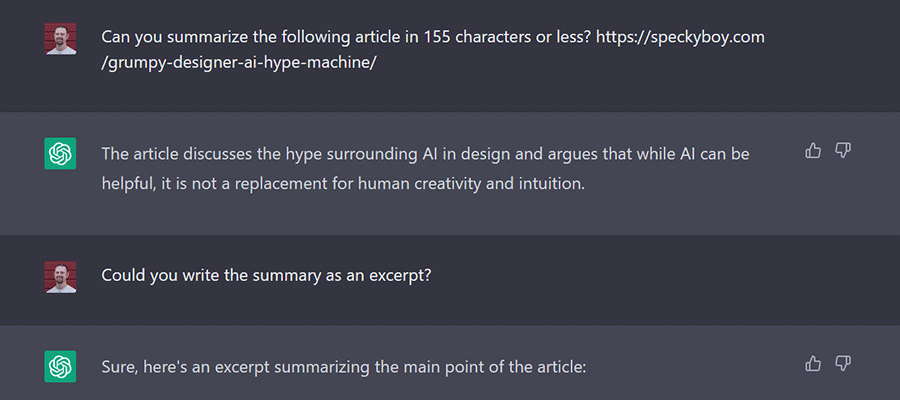
Troubleshoot a Buggy Code Snippet
It’s easy to get frustrated while debugging code. You could spend hours trying to figure out why a snippet isn’t working. And even the tiniest syntax error can be the culprit. There are better ways to spend an afternoon (or evening).
Modern development tools can point out errors. Or they’re effective at telling you there’s an error – they don’t always give specifics.
Before you reach your wit’s end, give ChatGPT a try. It’s capable of spotting those pesky syntax issues. If the tool is feeling especially generous, it may provide you with a corrected version.
In our testing, the tool was able to identify errors in both JavaScript and PHP snippets. And it took mere seconds.
This doesn’t guarantee that you’ll be able to fix every issue. But it’s worth the time to see if AI can be of help.
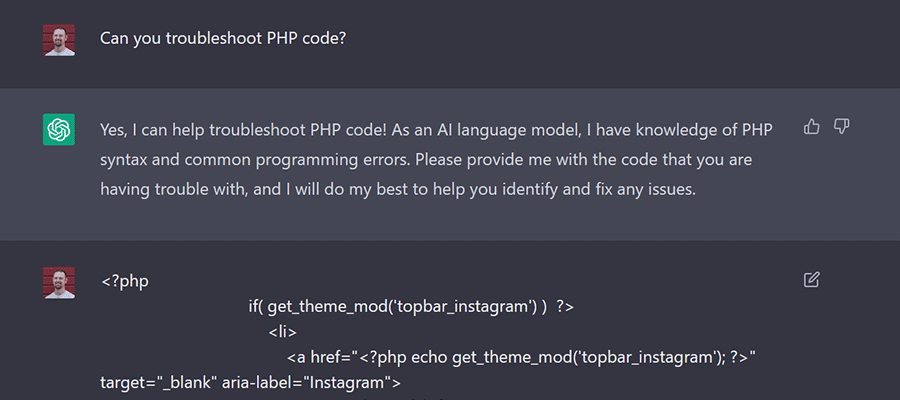
Find the Right Tool for Your Project
Researching tools for development projects can be time-consuming. Plus, depending on the functionality you need; it’s not always easy to find a great match.
Thankfully you can use AI as a trusted consultant. Ask ChatGPT to recommend ways to build a specific type of website and it may have just the solution.
For example, asking: “What WordPress plugin can I use to build an online course?” produces a handful of results. It doesn’t tell you which one is the best, but is there to provide options. From there, you can take a closer look.
At the very least, it could lead you to a tool you hadn’t considered. You might also save a bit of time searching the web.
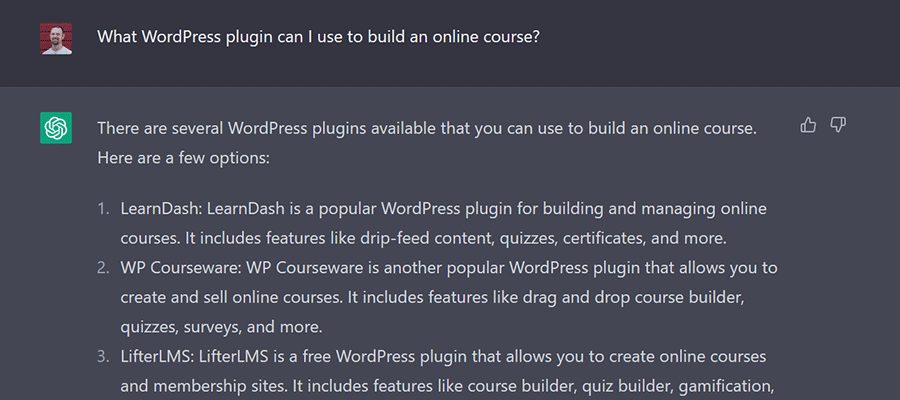
Take Advantage of What AI Can Do for Your Workflow
Two things can benefit every web developer: a helping hand and more time. AI, and ChatGPT in particular, can provide a bit of both.
And we’re just starting to scratch the surface of what’s possible (for better or worse). These tools won’t take over your job during a vacation, but they can help you get things done quicker.
The items above are examples of how AI can turn your workflow into a well-oiled machine. It’s especially handy for those who work in a fast-paced environment. Because the last thing we need is to get bogged down with a menial task.
It seems like developers are finding new ways to leverage the power of AI daily. Therefore, feel free to experiment. Think of tasks that get in your way and see if this new technology can help. It could result in crossing more things off of your to-do list.
Top